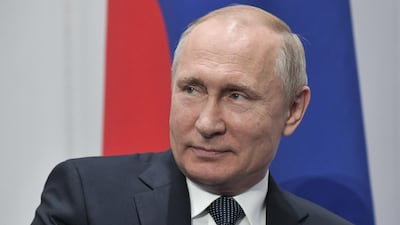The UN Security Council will hold an open meeting on Thursday at Russia's request about a US missile test that would have been banned under a treaty that Washington and Moscow abandoned this month.
Russia's deputy UN ambassador, Dmitry Polyansky, said on Wednesday that Moscow called the meeting "because of the threats the US pronounced on the deployment and development of the missiles, in breach of the agreements".
"The urgency is that there are a lot of threats," Mr Polyansky said. "We are on eve of the new arms race. We want to discuss this issue."
The Trump administration accused Russia of being unwilling to stop breaching the 1987 Intermediate-range Nuclear Forces Treaty.
Russia accused the US of the same and both withdrew from the treaty on August 2.
Washington said it had tested a modified, ground-launched version of a Tomahawk cruise missile that hit its target more than 500 kilometres away.
The weapon was not armed with a nuclear warhead, officials said. But the missile was banned under the INF Treaty.
Moscow said it was in full compliance with the treaty, which was signed between Ronald Reagan and Mikhail Gorbachev in 1987.
The US set about abandoning the International Nuclear Forces Treaty, which was the only Soviet-era arms control agreement still intact, shortly after US President Donald Trump took office in 2016.
A list of the animal rescue organisations in the UAE
Killing of Qassem Suleimani
Conflict, drought, famine
Estimates of the number of deaths caused by the famine range from 400,000 to 1 million, according to a document prepared for the UK House of Lords in 2024.
It has been claimed that the policies of the Ethiopian government, which took control after deposing Emperor Haile Selassie in a military-led revolution in 1974, contributed to the scale of the famine.
Dr Miriam Bradley, senior lecturer in humanitarian studies at the University of Manchester, has argued that, by the early 1980s, “several government policies combined to cause, rather than prevent, a famine which lasted from 1983 to 1985. Mengistu’s government imposed Stalinist-model agricultural policies involving forced collectivisation and villagisation [relocation of communities into planned villages].
The West became aware of the catastrophe through a series of BBC News reports by journalist Michael Buerk in October 1984 describing a “biblical famine” and containing graphic images of thousands of people, including children, facing starvation.
Band Aid
Bob Geldof, singer with the Irish rock group The Boomtown Rats, formed Band Aid in response to the horrific images shown in the news broadcasts.
With Midge Ure of the band Ultravox, he wrote the hit charity single Do They Know it’s Christmas in December 1984, featuring a string of high-profile musicians.
Following the single’s success, the idea to stage a rock concert evolved.
Live Aid was a series of simultaneous concerts that took place at Wembley Stadium in London, John F Kennedy Stadium in Philadelphia, the US, and at various other venues across the world.
The combined event was broadcast to an estimated worldwide audience of 1.5 billion.

